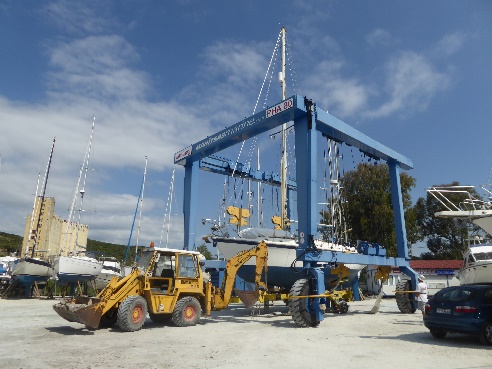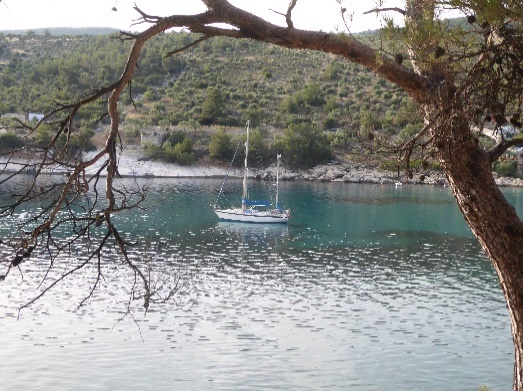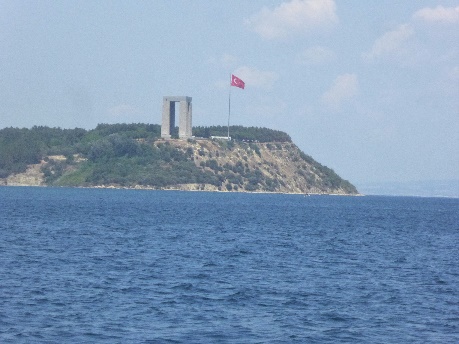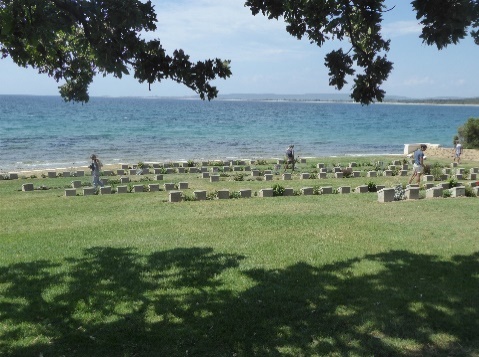June 2016 : Into the Sea of Marmara
LaterEarlier |
Merhaba from Karabiga – a small fishing port just into the Sea of Marmara. We are a
little behind our plans, having originally hoped by now to have made it to Istanbul –
but we’re well on the way with only about 100 miles to go. The delay is down to taking
longer over preparations than expected and also by weather – the Med fully living up to
its reputation for all or nothing winds. Our plans for the summer are to continue northwards into the Black Sea, up the Bulgarian and Romanian coasts and then to cross over to the northern coast of Turkey and from there westwards back to Istanbul. Having arrived We went off to ensconce ourselves in an Airbnb we had booked for a few days until the boat could become habitable. The owner, Oksana, was from Donetsk in the Ukraine – a Russian, fleeing the fighting she was keen to stress. We didn’t feel this was an issue to be pursued and got on quite happily, later having a meal in her restaurant where we met her baboushka mother. Refreshed by a good night’s sleep the next day it all looked a lot better. Repainting the hull with primer and anti-fouling caused some frustration in that This left us with the routine pre-cruising jobs. After 8 months lay-up in a dusty boat-yard, the boat always needs a lot of titivation and sprucing up – the teak, deck, polishing etc. Putting the sails on checking rigging and instruments, etc. Servicing the outboard engine. Clean teak, deck and hull. Clean the filthy dinghy. Big provisioning trip to nearby Lidl. It is amazing that having owned the boat for 9 years, the first 2 of which involved a major refit, we still dream up minor modifications and improvements to make every year. For example we wired in more charging points for computers, cameras and phones, and fitted extra towing points the dinghy. We were baffled to find when we went to buy rope in the local hardware store for another job that rope is sold by weight! The boatyard was the busiest we have been in and buzzing with the activity of yacht crews
engaged in the same work as ourselves, as well as a couple of fishing boats grinding
away at their hulls. Our time over this two weeks was not entirely devoted to work – we gave ourselves a cultural day off to visit the great ancient site of Philippi, dating from 3rd century BC. A very significant site for several reasons – the Battle of Philippi, where Cassius and Brutus both committed suicide marked a turning point in Roman history from Republic to Empire, and later visitations by Paul establishing the first Christian church in Europe. We also learned the less historically significant fact that in Roman times public toilets were known as ‘vespasians’, after the emperor who levied a tax on them. Eventually the work was done and it came time to set off sailing. We left the shores of
mainland Greece for the island of The following day we motored south on a glassy sea between mighty Mount Athos (2020
metres) 25 miles away to the west and the island of Samothraki (1611 metres) 25 miles to
the east - our destination of low lying We used our extended stay in Limnos to chill and to explore the island. The little town had everything we needed – especially a delightful taverna right at the head of the quay whose charming proprietor couldn’t have been more helpful with car hire, laundry, etc. A great bonus was that the harbour – unlike most – was clean enough to swim in. The huge bay was an interesting historical location having been the base for the Gallipoli campaign in the First World War. We visited the poignant military cemetery just outside town with graves of 900 soldiers and sailors from Britain, Australia, New Zealand, India and Newfoundland – those who had been brought here wounded but not made it. We spent a day exploring the island by car – little touched by tourism and very rural - looking in places almost English with fields and trees. Chris was inexplicably thrilled to see a 1950s combine harvester at work. Ancient sites included late Neolithic Poliochni – founded in 5000-4000BC – the oldest city in Europe. Other highlights were flamingos in a salt lagoon and some bizarre coastal rock formations. We enjoyed an evening event on the quay connected with St John, involving children leaping over heaps of straw on fire. No one was quite able to explain the reasons for this – just as they weren’t in Galicia in Spain when a few years ago we witnessed an event on the same date also involving fires. All good family fun anyway. Ironically but coincidentally, we had planned to leave Greece for Turkey on the day of
the Referendum. However, unable to Europe leave physically, we had plenty of time to
digest the terrible news of Brexit with feelings of disbelief, dismay and despair. We
follow news and comment on the internet, so don’t feel too much out of it, and not
seeing TV is probably a blessing. At last we were able to make the passage from Limnos to Turkey – feeling sad to be leaving Greece after 2 summers cruising, heightened on our final night by a live performance of traditional Greek music at the taverna, which in turn exacerbated the huge sadness of leaving the EU. In true Mediterranean fashion the winds didn’t simply moderate, but turned off completely
and we had hardly a breath of wind as we departed at dawn for the 65 mile passage – or
for the rest of the day. Our destination was the
Dardanelles – the 40 nautical mile long strait linking the Sea of Marmara (which in turn
links to Istanbul and the Black Sea) with the Aegean – a challenging prospect. The
strait carries a high density of shipping to and from major Black Sea ports – notably
Russian, and the prevailing wind blows down the channel, combined with a strong current
in the same direction. Our route took us to the
northern entrance of the strait thereby avoiding the scary conglomeration of shipping
entering and leaving. We arrived safely into While in Cannakale we took a tour to the Gallipoli peninsular on the western side of the
strait to visit the battle sites and memorials – both Allied and Turkish - of the
Gallipoli campaign – finding ourselves 2 of only 3 non-Aussies on the bus.The pretty
wooded hills and beaches fringing the bright turquoise sea looked so innocent - hard to
imagine the bloody landing of soldiers under heavy fire and gruelling trench warfare.
Gallipoli seemed to be more about valour and endurance on both sides than the result –
though Attaturk’s success paved the way for the modern Turkish Republic. Then back to the passage through Dardanelles – another 24 miles. Once the “wow we’re in
the Dardanelles” factor had worn off this was just a reasonably pleasant passage under
engine – sailing is prohibited in Dardanelles – along an undramatic coastline of low
wooded hills, accompanied by a constant stream of shipping. Something more spectacular
might have been expected at such a dramatic split in the land with its significance as
the boundary between Europe and Asia. We anchored for the night off a scrubby beach at No doubt July will also see us consuming news and comment on the unfolding tumultuous events at home – but hopefully there will also be plenty of wonderful distractions. |

 It was hard work sorting out the chaotic mess inside the boat, but Filip arrived to
discuss the head-lining and after a few days his jobs were completed to our
satisfaction. George the mechanic who had worked on the cutlass bearing turned out not
to have been mad after all and got the new cutlass bearing fitted in a morning – though
he did have trouble with our feathering propeller which he had dis-assembled. Chris felt
sure there was something wrong in how it looked, though George was adamant it was right.
However, Chris was right – it would only have propelled us backwards! The UK
manufacturer helpfully sent a video guide to re-assembly and all was well – ‘bomba’ as
George put it.
It was hard work sorting out the chaotic mess inside the boat, but Filip arrived to
discuss the head-lining and after a few days his jobs were completed to our
satisfaction. George the mechanic who had worked on the cutlass bearing turned out not
to have been mad after all and got the new cutlass bearing fitted in a morning – though
he did have trouble with our feathering propeller which he had dis-assembled. Chris felt
sure there was something wrong in how it looked, though George was adamant it was right.
However, Chris was right – it would only have propelled us backwards! The UK
manufacturer helpfully sent a video guide to re-assembly and all was well – ‘bomba’ as
George put it.  the yard saw no point in ordering the paint until we were actually waiting to apply it,
rather having it ready in advance as we had requested a couple of months earlier. Maybe
an illustration of the Greek malaise? However, all was well even if the primer is in two
colours as there was not enough of one colour. Applying the 3 coats was hard work but
will save much time in future years. Also now with a perfectly smooth bottom, the boat
will obviously go much faster through the water!
the yard saw no point in ordering the paint until we were actually waiting to apply it,
rather having it ready in advance as we had requested a couple of months earlier. Maybe
an illustration of the Greek malaise? However, all was well even if the primer is in two
colours as there was not enough of one colour. Applying the 3 coats was hard work but
will save much time in future years. Also now with a perfectly smooth bottom, the boat
will obviously go much faster through the water!  The
boats were packed in so tightly that a two stage process was required to extricate them
for launch – first on to low-loader needing less space – to move them to the travel-lift
for putting in the water. There were a couple of British boats being prepared for summer
chartering, several Bulgarian yachts, French, Dutch, and Swiss. We made friends with a
Greek/Belgian couple lovingly restoring a Contessa 32.
The
boats were packed in so tightly that a two stage process was required to extricate them
for launch – first on to low-loader needing less space – to move them to the travel-lift
for putting in the water. There were a couple of British boats being prepared for summer
chartering, several Bulgarian yachts, French, Dutch, and Swiss. We made friends with a
Greek/Belgian couple lovingly restoring a Contessa 32.  Ironically this turned out to be the last windless day for some time - the following
day the wind starting picking up from the north with a Meltemi forecast. We went through
the agonies of indecision typical for yachties (we assume) – whether to leave on our
planned next passage earlier than intended to get ahead of the weather, or to bide our
time for who knows how long. Difficult, because having taken longer than anticipated
over our preparations, we were now keen to get on our way to Istanbul. However, having
only just arrived on Limnos and being unprepared for an immediate hard 60 mile slog to
windward, we took the prudent option and enjoyed a fast downwind sail around to the
south of the island into the great bay of Moudros well protected from the north. Our
previous experience of the Meltemi (the seasonal Aegean wind from the north) has been
for 2 or 3 days of strong winds before it all calms down again. But this was something
different – much stronger winds than usual lasting a full 6 days. However, we fell on
our feet in
Ironically this turned out to be the last windless day for some time - the following
day the wind starting picking up from the north with a Meltemi forecast. We went through
the agonies of indecision typical for yachties (we assume) – whether to leave on our
planned next passage earlier than intended to get ahead of the weather, or to bide our
time for who knows how long. Difficult, because having taken longer than anticipated
over our preparations, we were now keen to get on our way to Istanbul. However, having
only just arrived on Limnos and being unprepared for an immediate hard 60 mile slog to
windward, we took the prudent option and enjoyed a fast downwind sail around to the
south of the island into the great bay of Moudros well protected from the north. Our
previous experience of the Meltemi (the seasonal Aegean wind from the north) has been
for 2 or 3 days of strong winds before it all calms down again. But this was something
different – much stronger winds than usual lasting a full 6 days. However, we fell on
our feet in
 Motoring in the calm conditions we made good time, despite current
against us fanning out from the strait. We decided to continue on up to the marina in
Cannakale rather than anchoring in a cove at the
Motoring in the calm conditions we made good time, despite current
against us fanning out from the strait. We decided to continue on up to the marina in
Cannakale rather than anchoring in a cove at the 